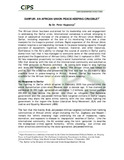| dc.description.abstract | The African Union has been acclaimed for its leadership role and engagement
in addressing the Darfur crisis. International consensus is almost emerging in
favor of substantial increase of the presence of the African Union Mission in
Darfur, including expansion of the size of its monitoring force and a clear
mandate for its troops to protect civilians. Rapid expansion of the African Union
mission requires a corresponding increase in its peace-keeping capacity through
provision of equipment, logistical, financial, material, and other resources.
Confidence in the AU’s ability to change the course of events in Darfur partly
stems from fact that it has managed to overcome some of the constraints that
paralyzed the Organization of African Unity (OAU) that it replaced in 2001. The
AU has responded proactively to today’s worst humanitarian crisis, unlike the
OAU that stood by with the rest of the international community and watched as
the 1994 genocide in Rwanda unfolded. By taking bold steps to stop fighting
and stem the humanitarian crisis in Darfur, the African Union has raised its
profile, but the crisis has also presented the first real test for its viability as a
credible force in peace-keeping in Africa. Indeed, Darfur has become the
crucible for the African Union’s future role in peace-keeping. | |

